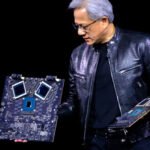
Samsung Electronics Co., the world’s top memory chipmaker, is developing an artificial intelligence modem chip designed for satellite communications, targeting SpaceX’s Starlink network as part of its next-generation non-terrestrial 6G ambitions.
A senior executive from Samsung’s semiconductor division recently met with SpaceX officials to share technical details and development progress on the chip, according to people familiar with the matter on Thursday.
The chip aims to enable direct connections between low-Earth orbit (LEO) satellites and consumer devices, bypassing traditional ground-based base stations.

Industry analysts said the technology could upend the conventional telecom architecture and underpin what is forecast to become a 740 trillion won ($530 billion) market by 2040.
Internal presentation materials obtained by The Korea Economic Daily show that Samsung’s System LSI division is developing a new Exynos modem integrated with an AI accelerator, or neural processing unit (NPU).
Existing chipsets have limited capability to track fast-moving satellites and maintain beam alignment, but the AI-enhanced modem is designed to predict satellite trajectories and optimize signal links in real time, sources said.
Benchmark data shared in the presentation suggest the new Exynos modem can improve beam identification and channel prediction capabilities by 55 and 42 times, respectively, compared with current models.

SPACEX, THE TARGET CUSTOMER
The target customer, sources said, is SpaceX.
“Talks are underway for Samsung to join the component supply chain of SpaceX’s non-terrestrial 6G network, which aims to connect the entire globe through its Starlink satellites,” said one of the people familiar with the matter.
The 6G non-terrestrial network (NTN) is viewed as critical infrastructure for autonomous vehicles and humanoid robots, which require ultra-low latency and uninterrupted connectivity.
To support the system, SpaceX last month purchased 50 MHz of wireless spectrum and global mobile satellite service (MSS) frequencies for about $17 billion.

Analysts said Samsung’s growing collaboration with Elon Musk’s companies underscores its ambitions to expand its footprint beyond smartphones and memory chips.
Their relationship has recently extended into Tesla’s in-house AI semiconductor program.
TESLA’S AI5 CHIP PRODUCTION SPLIT BETWEEN TSMC, SAMSUNG
On Wednesday, Musk said during Tesla’s third-quarter earnings conference call that both Samsung and Taiwan’s TSMC will manufacture Tesla’s new AI5 chip, clarifying earlier indications that TSMC is the sole producer of the AI chip.

The AI5 is Tesla’s upcoming, in-house developed chip aimed at powering the electric vehicle maker’s next generation of full self-driving (FSD) technology and its planned Optimus robot.
The twin-track partnership highlights the Korean tech giant’s strategy to secure early leadership in the convergence of space, AI and communications, an emerging frontier expected to define the next phase of the semiconductor industry.
In July, Tesla selected Samsung to produce its AI6 processor under a $16.5 billion contract.
By Hae-ryung Kang and Chae-Yeon Kim
hr.kang@hankyung.com
In-Soo Nam edited this article.















